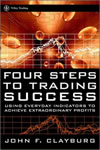|
|
|
Cyclone
It is very important that potential users of the Cyclone'98 System be familiar with the wide swings in equity which will occur when this system is traded. The system will usually trade between 70 to 90 times during any respective quarter. However, it is a rare event to have more than 50% of these trades in the profit column. Carefully examine the Cyclone System Equity Curve for an example of this pattern. This system will realize most of its profit from perhaps as few as 15% of its trades during the course of an entire quarter. Cyclone '98 realizes its profitable performance by capturing the big trades that occur somewhat infrequently. The majority of the trades are small wins and small losses which are taken while the system waits for the big trade to come along. The system will put your account through an incredible "roller coaster ride". Although the Cyclone Equity Curve will demonstrate that the system tests profitably for all but 6 quarters during the last 11 years, you should realize that the path to the types of profits the system can produce is far from a steady, gentle climb. It is this feature of the system which makes it difficult for some users to follow. Most who are not successful with this system are those who try to out guess the system by taking only selected trades or getting out of trades early with a modest profit. What usually happens is the trader will either miss the big trade entirely or leave a big portion of it on the table by exiting prematurely. _________________________________________________________
|
 By John F. Clayburg
JOHN WILEY & SONS, INC. |